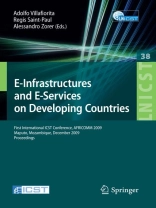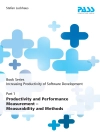The first edition of a conference is a significant organizational and scientific gamble. In some cases, these challenges are rewarded by results well above the initial expec- tions. AFRICOMM 2009, the First International ICST Conference on e-Infrastructure and e-Services for Developing Countries, was clearly one of such cases. The conference aimed at bringing together international researchers, public of- cers, policy makers and practitioners in ICT to discuss issues and trends, recent research, innovation advances, and on-the-field experiences related to e-Government, e-Governance, e-Infrastructure, and e-Business, with a focus on developing countries. It is in fact widely accepted that ICT Infrastructure and (e-*)services are key drivers for development, well-being, and improved quality of life. This was also highlighted by Kofi Annan, former UN General Secretary, in 2002: “While ICT cannot address all of [Africa’s] problems, they can do much to place Africa on a firmer industrial footing. and strengthen the continent’s human resources, with training that leads to sustainable livelihoods. ” AFRICOMM 2009 was organized in three tracks: two of them organized as Research Tracks, on Information and Communication Infrastructures and on e- Services for Developing Countries, and one Policy and Governance Track. Contri- tions to the first two tracks were selected by peer-review, while the policies session involved key stakeholders in the areas of ICT, development, and policy making who submitted position papers. Participation and selection of papers for the tracks was quite good.
表中的内容
Fostering Learning through the Use of Argumentative Serious Games.- Using Cell Phones to Improve Language Skills: The Hadeda Project.- Mobile Learning Content Authoring Tools (MLCATs): A Systematic Review.- A Rural Implementation of a 52 Node Mixed Wireless Mesh Network in Macha, Zambia.- e-Justice Implementation at a National Scale: The Ugandan Case.- Supporting Public Administration with an Integrated BPR Environment.- SAMBA Project Experiences.- E-Voting: A South African Perspective.- Boul Sat Project: Low-Cost Wireless Metropolitan Network Implementation in Burkina Faso.- Telemedicine as a Tool for Europe-Africa Cooperation: A Practical Experience.- Implementing Mobile Phone Solutions for Health in Resource Constrained Areas: Understanding the Opportunities and Challenges.- Application of Geographic Information System (GIS) in Drug Logistics Management Information System (LMIS) at District Level in Malawi: Opportunities and Challenges.- Converged Infrastructure for Emerging Regions – A Research Agenda.












